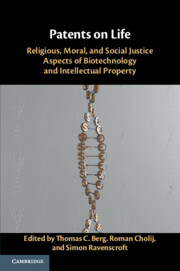 Patents on Life
Patents on Life from II - Religious Perspectives on Life Patents
Published online by Cambridge University Press: 28 September 2019
An important, contemporary controversy is how the policy balance of incentives that provides the basic rationale for intellectual property (IP) protections should be assessed in the context of protection for genetic sequences. After summarizing this general rationale and the state of the law in the US concerning the protection of genetic sequences, the chapter consider the issues from the perspective of Jewish law. While the classic texts of Jewish law for the most part preceded the rise of IP law by centuries, we argue that a distinctly halakhic theory of IP can nonetheless be derived from the application of Talmudic unfair-competition principles to IP questions by halakhic authorities beginning in the Early Modern period. We further contend that because this Talmudic doctrine is equitable in nature and operates to protect broad social interests, it provided halakhic authorities with a more flexible, context-sensitive model for IP law than does the personal-property basis undergirding much of secular, contemporary patent and copyright law. Finally, we suggest that if contemporary courts were to adopt such a model for IP, halakha could offer various insights regarding policy considerations and value judgments pertinent to determining patent eligibility for genetic inventions.
To save this book to your Kindle, first ensure no-reply@cambridge.org is added to your Approved Personal Document E-mail List under your Personal Document Settings on the Manage Your Content and Devices page of your Amazon account. Then enter the ‘name’ part of your Kindle email address below. Find out more about saving to your Kindle.
Note you can select to save to either the @free.kindle.com or @kindle.com variations. ‘@free.kindle.com’ emails are free but can only be saved to your device when it is connected to wi-fi. ‘@kindle.com’ emails can be delivered even when you are not connected to wi-fi, but note that service fees apply.
Find out more about the Kindle Personal Document Service.
To save content items to your account, please confirm that you agree to abide by our usage policies. If this is the first time you use this feature, you will be asked to authorise Cambridge Core to connect with your account. Find out more about saving content to Dropbox.
To save content items to your account, please confirm that you agree to abide by our usage policies. If this is the first time you use this feature, you will be asked to authorise Cambridge Core to connect with your account. Find out more about saving content to Google Drive.